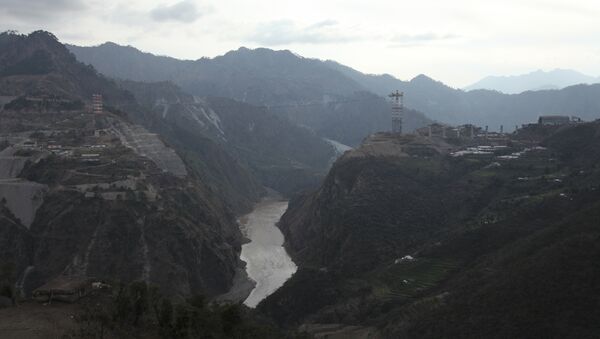The only alternative for these villagers is to airdrop bodies from a bridge and then take them to the cremation venue on the banks of the river.
These villagers, belong to India’s lower caste or Dalit community, and so they are forced to carry their dead to a 20-foot high bridge and lower the bodies from there to get to their cremation grounds to perform the last rites, Indian daily the Times of India reported.
The bizarre reality has been a common sight on the banks of the River Palar in Narayanapuram Village in the state’s Vellore District for the past four years.
A heart-wrenching video of the body of a dead person being lowered to the river bank for cremation went viral on Wednesday.
Dead body of a Dalit man had to be lowered from a bridge as people belonging to upper caste community allegedly denied permission to take out his funeral procession through their agricultural lands in Vellore.
— Shilpa Nair (@NairShilpa1308) August 22, 2019
This is the sad reality of 21st century India! pic.twitter.com/YeQUJakxFj
The body of the Dalit person was identified as that of 55-year-old Kuppan, a resident of the Narayanapuram Dalit Colony. He died in a road accident last Friday, the daily reported.
A relative of Kuppan said when they tried to take his body through a short route leading to the river's bank; watchmen guarding that path refused them entry, saying it was passing through farmland belonging to upper-caste Hindus.
To avoid a clash, the Dalit villagers used a cradle made of wood to carry the body to the bridge and airdropped it from there. After that, some of them used another path to reach the place of cremation to perform the man's last rites.
Narayanapuram Dalit Colony resident Krishnan said: "As we have been denied entry, we are using cradles to lower bodies from the bridge. Over the past four years, we cremated four bodies like this. Kuppan was the latest."
Krishnan said they have been cremating their dead on the riverbank since there is a deficit of space in the village crematorium.
A section of netizens expressed concern that such discriminatory practices still exist in 21st century India.
Can one believe that!
— Raja Faisal 🇵🇰❤️🇳🇿 (@RajaFaisal01) August 22, 2019
We’re living in a world where this still takes place...
Stone Age religious practices of #Hinduism must be brought to an end now. 🤷🏽♂️
Pls don't make it a 21st Century India issue with a CASTE SPIN.The issue is with local Administration.Its very fashionable to criticize India for few minutes of prime time. In REALITY such reporting is the 21st century India issue & it has to do with Laptop warriors like u
— Dheeresh Manrai (@dmanrai) August 22, 2019
Shameful. Strict action must be taken against any idiots who are preventing these folks from using a *public road*.
— Firestarter (@Firezstarter1) August 22, 2019
Another group of netizens said using the term “upper castes” insinuated that those belonging to them endorse this bizarre practice in spite of strict laws being in place to prevent social discrimination in the country.
Pls name the so called upper caste .
— Balaji R 🇮🇳 (@balajir2910) August 22, 2019
Else the insinuation is to Brahmins who are needlessly vilified as beneficiaries of the caste system which is far from truth
Read the threads in detail pUls.. Usually you get more info. Looks like this was a "LACK OF A ROAD OR ACCESS " issue to the crematorium. So, this is a problem of the local administration. Not other caste people.https://t.co/rUNN3Rp1o4
— Rag (@ragways) August 22, 2019
Question could be asked is "Why cant the land owner let the procession pass through ?". Usually its not a caste issue. Its a paranoia among most ppl, that if you allow ur land to be used as a thorough fare, eventually, it will turn into a formal road. So, ppl, close it down.
— Rag (@ragways) August 22, 2019
Bad people exist everywhere even in pakistan. Don't try to score brownie points on this issue.
— kathiravan (@Kathir_1988) August 22, 2019
We already started probe on this issue and will make sure it won't happen issue.
Dalits in the village said they don’t face direct caste discrimination or threats, but said there was a need for the district administration to remove illegal encroachers and encroachments.
The Vellore district administration said it is probing the incident.
In India, caste refers to hereditary classes of Hindu society. In ancient times castes were determined by an individual’s professional capabilities. Over a period of time, class distinctions were distorted to such an extent that it led to inter-community competition, conflict, disagreement and dissatisfaction. This further resulted in widening the gap between communities. Societal discrimination worsened over time, allowing for excessive political intervention and what is commonly referred to as caste politics.
Caste conflict in Indian society has deep roots for political and economic reasons. Upper castes generally refer to land-owning castes, while lower castes comprise of marginal and underprivileged rural people. The Scheduled Castes of which the Dalits are a significant component, invariably refer to socio-economically disadvantaged rural dwellers.


